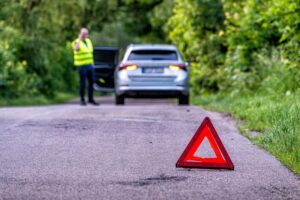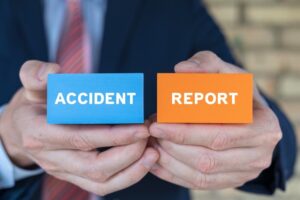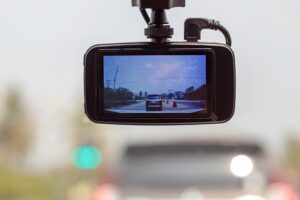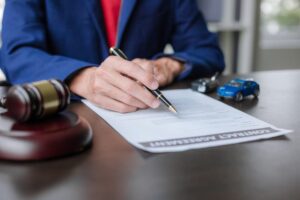You’re trying to piece together what happened in a moment that felt like a blur. There was a noise, maybe a jolt, and now you’re dealing with repair estimates, insurance adjusters, and an unclear version of events. That confusion is normal. Accidents happen fast, and when they’re over, everyone has a version of what went wrong.
How can you tell who hit who? What matters when the truth isn’t obvious and both sides point fingers? A car accident lawyer will investigate to find the real story in the aftermath – because even if you’re unsure of the details, your instincts are often right. And your instincts brought you here for a reason.
Facts Speak Louder
 It’s not uncommon for drivers to recall the same crash in completely different ways. Emotions run high, adrenaline clouds perception, and sometimes people say things that feel true to them in the moment – even if they’re not. You might find yourself wondering if you misread something. Or you may know with absolute certainty that you weren’t the one who caused the collision, even if the other driver insists otherwise.
It’s not uncommon for drivers to recall the same crash in completely different ways. Emotions run high, adrenaline clouds perception, and sometimes people say things that feel true to them in the moment – even if they’re not. You might find yourself wondering if you misread something. Or you may know with absolute certainty that you weren’t the one who caused the collision, even if the other driver insists otherwise.
That’s where physical evidence plays a central role. An attorney will review the actual condition of both vehicles, where they ended up after impact and the damage patterns. Crumple zones, angles of impact, and the location of dents and scratches often tell a clearer story than words ever could. In many cases, the vehicle that sustained front-end damage in a rear-end collision is the one that struck the other. But there are exceptions. That’s why a car accident attorney will dig deeper and not settle for surface-level assessments.
If nearby buildings or homes had security cameras, or if the collision occurred near an intersection with traffic cameras, a lawyer will request that footage immediately. Video doesn’t always exist, but when it does, it becomes one of the most straightforward ways to tell who hit who. Those clips sometimes provide answers that erase all doubt.
Witnesses Remember What Drivers Might Miss
You might not have noticed the pedestrian waiting on the sidewalk. Or the driver two lanes over who had a perfect view of the accident. Third-party witnesses aren’t emotionally invested in the outcome. They’re usually the ones who can offer calm recollections. But they can also disappear fast.
When you meet with a car accident lawyer, one of the first things they’ll do is ask about anyone who stayed behind to help. If contact information was collected, that’s the first step. If not, they’ll try to locate witnesses by checking nearby businesses, reviewing 911 call records, or working with an investigator. The sooner that happens, the more likely it is that someone still remembers the details clearly.
Witness statements help shape a clearer timeline. If someone saw a vehicle run a red light or fail to yield, your attorney will use that information to support your version of events. Even when the physical evidence feels ambiguous, a reliable account from a third party often tips the scale.
Accident Reports Aren’t Always the Last Word
 There’s a tendency to believe that when a police report places blame on one driver, the case is closed. But reality doesn’t work that cleanly. Officers often show up after the chaos has already calmed down. Cars may have been moved. Drivers may be shaken or unsure. Witnesses might have already left. One person might speak confidently, while the other is too stunned to say much. These early impressions can lead to inaccuracies that stick with you longer than they should.
There’s a tendency to believe that when a police report places blame on one driver, the case is closed. But reality doesn’t work that cleanly. Officers often show up after the chaos has already calmed down. Cars may have been moved. Drivers may be shaken or unsure. Witnesses might have already left. One person might speak confidently, while the other is too stunned to say much. These early impressions can lead to inaccuracies that stick with you longer than they should.
Your car accident lawyer won’t treat that report as the final answer. It’s not the whole picture and shouldn’t be treated like it is. Instead, they’ll use it as a starting point, weighing it against the physical evidence, your account, and anything else that helps reconstruct what actually happened.
Sometimes, officers write what they see or are told at the moment, but circumstances evolve after the report is filed. Your attorney will recognize that and challenge any incorrect assumptions that place blame where it doesn’t belong. A flawed report shouldn’t shape the outcome of your case – and it won’t, not if your lawyer is watching out for you.
What Reports Often Miss
There are many reasons a report might not reflect the full truth. Maybe the officer relied on the statements of just one driver because the other was injured or already receiving medical care. A language barrier might have gotten in the way, or the reporting officer misunderstood a key point. Sometimes, especially in busy jurisdictions, officers must move quickly to get traffic flowing again, this can mean skipping over small but meaningful details.
Those gaps are critical. A car accident lawyer will ask the right questions to uncover what’s missing. They’ll compare your version of events to what’s in the report, and if there’s a disconnect, they’ll find out why. This isn’t about creating doubt for the sake of it. It’s about finding facts that support your case – facts that might’ve been overlooked in the rush to clear the scene.
Vehicle Data Tells a Digital Story
 What your car records behind the scenes can be just as important as what anyone says out loud. Many modern vehicles are equipped with event data recorders, similar to the black boxes used in airplanes.
What your car records behind the scenes can be just as important as what anyone says out loud. Many modern vehicles are equipped with event data recorders, similar to the black boxes used in airplanes.
These systems track specific movements and actions in the seconds leading up to a crash. They may show whether you hit the brakes, turned the wheel, or tried to accelerate. They can also show if you were stopped completely before the impact, which can make all the difference when the other driver claims otherwise.
Your car accident attorney will know how to obtain this information before it disappears. Retrieving it often involves contacting the vehicle’s manufacturer or the repair shop holding your car. Timing is key. If the vehicle is totaled, scrapped, or sold at auction, valuable data can be lost forever. A lawyer who understands what’s at stake will move quickly to preserve it.
Digital Evidence Offers Confidence
When everything else feels uncertain, digital records bring clarity. You don’t have to rely on memory alone. You don’t have to worry that the other driver’s words carry more weight just because they said something first. Vehicle data can show that you were acting safely, even if someone else says otherwise. It provides confidence when dealing with insurers, adjusters, or even a judge if it comes to that.
A car accident lawyer will recognize the importance of timing. They’ll make the calls, file the requests, and do what’s necessary to prevent valuable data from slipping through the cracks. That’s especially important when an insurance company is already trying to shape the narrative.
Insurance Companies Push for Fast Conclusions
You’ll likely get a call from the other driver’s insurance company just days after the crash. Adjusters commonly ask for a recorded statement under the guise of just clearing things up. But they’re not neutral, and they’re not working in your interest.
They’re hoping you’ll say something they can use to shift the blame – something as simple as “I didn’t see them” or “I thought they were stopping.” Those words might feel harmless at the time, but in the hands of an insurance company, they can be used to cast doubt.
Your attorney will step in before that happens. You don’t need to speak to the other side’s insurance carrier, especially not on your own. A car accident lawyer will take over that communication and protect your version of events. They’ll make sure your words aren’t twisted, and they’ll handle any questions with care. They know how to keep the focus where it belongs – on the truth, not on sound bites that can be taken out of context.
Blame Shouldn’t Be Rushed
Insurance companies want quick answers. They want to settle fast, close files, and move on. But your case deserves more attention than that. A car accident attorney will slow things down in the right way – just enough to ensure your rights are protected and your story is fully heard.
That means pushing back when an adjuster tries to assign blame based on a hasty interpretation of the police report. It means reviewing every piece of physical and digital evidence before responding to any claims. It means not letting the other side control the timeline when you need time to recover and regroup.
Photos Reveal Details Eyes Might Miss
You might have snapped pictures after the crash, or a bystander offered to send you theirs. Those images can be more valuable than you realize. Skid marks, debris patterns, and fluid trails on the pavement all offer clues about what happened in the seconds before and after impact.
An attorney will study those photos closely. They’ll often work with professionals who can interpret the impact angle based on damage and road markings. You might look at a photo and just see your crumpled bumper. An expert will see signs of movement, force, and direction – all of which can help prove who hit who.
Photos taken shortly after the collision are often the most helpful. That’s when the scene is untouched and raw. Later, roads are cleaned up, vehicles are towed, and valuable evidence can vanish. If you’ve got pictures, bring them to your consultation. They’ll be examined with care.
Traffic Laws Matter More Than Opinions
Even when people disagree on what happened, traffic laws serve as a guidepost. If a driver failed to yield, changed lanes without signaling, or made an illegal left turn, that behavior plays a critical role in deciding who’s at fault. A car accident attorney will compare what occurred to what’s outlined in local and state statutes.
The legal framework offers something solid to stand on when memories are murky. Your lawyer will use those laws to show what happened and why the other driver should be held responsible. They won’t just argue your case but build it with real, identifiable violations that support your claim.
A Free Consultation Helps You Understand Where You Stand
 You’re not expected to come into a consultation knowing everything. That’s not your job. It’s your car accident attorney’s job to listen to your concerns, answer your questions, and start building clarity around the situation. During a free consultation, you’ll have the opportunity to explain what you remember and share any photos, documents, or information you’ve collected.
You’re not expected to come into a consultation knowing everything. That’s not your job. It’s your car accident attorney’s job to listen to your concerns, answer your questions, and start building clarity around the situation. During a free consultation, you’ll have the opportunity to explain what you remember and share any photos, documents, or information you’ve collected.
Your lawyer will explain what steps they’ll take next – what kind of records they’ll request, how they’ll approach witness interviews, and what legal options you may have. You’ll have space to ask anything you need to know, whether it’s about timelines, medical bills, or how to respond to a letter from an insurer.
There’s no pressure to move forward unless you feel comfortable. The goal of the consultation is to give you a better understanding of your rights and whether it makes sense to move forward with legal representation. It’s a conversation, not a sales pitch.
A Car Accident Lawyer Is Ready to Set the Record Straight
Getting to the truth isn’t about attacking the other driver or casting them in a bad light. It’s about clarity. You deserve to know what happened. You deserve to have your story heard and backed up by facts. You’re not trying to take advantage of anyone – you just want to be treated fairly and move forward.
That’s why hiring a car accident lawyer can bring peace of mind. They’ll help sort through the confusion, push back against insurance tactics, and give you the confidence to stand your ground. You won’t be left guessing. You’ll be guided with care and purpose by someone who is on your side and ready to fight for what you have coming.
The path forward starts with a conversation. One where you’re not expected to have all the answers but where you’ll find someone ready to help uncover them. An experienced Chico personal injury attorney is ready to provide you with a free case review and outline your next steps.
